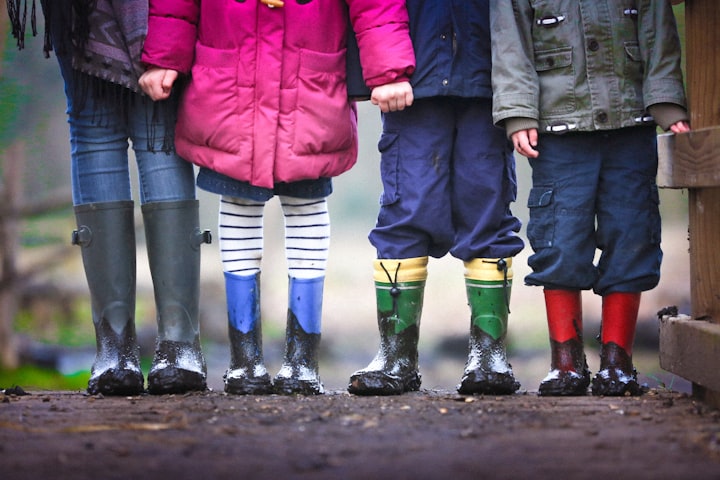Becoming a Better Parent
At one point in our lives, we all wish we were better parents. Many things can be done to be a better parent. You can stop yelling, you can say yes, but most importantly you can understand your child's developmental stages.
No instruction manual that comes with a child. Being a parent isn't something that is taught in school. Most of us learn to parent by modeling our parent's behavior. However, evolution has happened and times have changed. So what worked for our parents may not work for us. There has been more research into child development and as time goes on we learn more about children and how their brains work.
Parenting and What it Means
Parenting is raising your child, being there for them, loving them unconditionally, and teaching them right and wrong, plus so much more. When you parent your child, you aren't just telling them you love them, you are showing them you love them. You are teaching them how to behave, how to walk and talk. A good parent models good, acceptable behavior. A good parent is the person that they want their child to grow up to be.
Children aren't just born knowing the difference between right and wrong. They have to be taught what is right and what is wrong. Every interaction with your child is a learning experience. So you can not get angry and hit the walls and hit other people and expect your child to know that is wrong, they are learning that behavior is ok because you are doing it.
Push all that aside for the moment for this. One of the most important things you can do to be a better parent is to understand their developmental stages. There are several different stages alongside the many many developmental milestones that your child will reach and achieve over their lifetime. Let's talk about the different developmental stages your child will go through.

Infancy
That sweet and beautiful baby you are holding in your arms isn't born knowing what love is, they don't know anything about living. They have to learn everything. As infants, the first things they learn is who will feed them, love them, and answer their cries. Don't be afraid to hold your baby, love your baby, and snuggle your baby.
These infant days will seem to fly by and be gone before you know it. This is also the stage where they begin to develop the bonds with people that will grow with them. This is the stage where they begin to learn who their people are. SO snuggle that baby, build that bond, make it strong and show them you love them unconditionally. This is also the beginning stage for your child to learn self-soothing and self-regulation and neither of you even know it.
Toddler's and the Terrible Two's
Oh, how time flew by, and your sweet snuggly baby is now officially a toddler. This means that they are walking, and beginning to talk. They are continuously exploring the world around them. You guessed it, this stage is frustrating, however, it is not going to be the most frustrating stage you go through with your child.
Understanding this stage is understanding that your child is learning new skills every single day. They are changing and growing right before your eyes. This is also the stage where your child starts to become more independent. They want to start doing things on their own. While we call this stage the Terrible Two's, this stage actually occurs between the ages of 1 year old and 3 years old.
In this stage, you will also see changes in their social and emotional skills. They will begin learning to take turns, with parents, siblings, and other children. As they get closer to the end of this stage you will see them begin to follow simple directions and their language skills will really be developing.
This is the stage where your toddler may become more defiant. You will want to be sure to begin establishing boundaries in this stage. You will want to really develop a solid and consistent routine. When your child has a well-established, reliable, and consistent routine, they can adjust to changes easier. Even at this age children like to know what to expect next, and developing a routine helps them with that. Developing a routine also will aid your child in knowing what to expect next.
The Magic Years
The magic years are upon us now the ages of 3 years old to 5 years old, this is when your child's creativity and imagination kick in. They will begin telling you and anyone who will listen fantastical stories. During this stage, they will find a snuggle period again and want you to snuggle with them all the time.
This is the period where you can allow them to start helping you with simple chores, such as helping with place settings for dinner or helping get laundry out of the dryer. Of course, you will want to praise them for a job well done this will help them build their self-esteem. Their storytelling is a sign that their language skills are growing as well, so keep talking to them in full sentences and grown-up language.

Early Childhood
This is a big stage for your growing child. This is the stage where they develop more independence. Their social and emotional skills are ever-changing and they begin to want to be liked by their peers. You will experience changes in how they think, and learn. By now your child should be able to understand multi-step directions.
In addition to all their other changes, this is where they should understand their feelings more and be able to talk about them. As they progress through this stage you should see their thinking shift from about them to being more considerate of others.
As they progress through school in this stage, it is important to start talking to them about their day, what happened at school, their friends, and what they want to be when they grow up. Now that they have started school, they will experience pressure from their peers and become more curious about their environment. It is also a great time to start talking about responsibilities and give them one or two simple chores like taking the bathroom trash out and keeping their space picked up and neat.
School Age
Oh, the golden years of childhood. Your child has been in school for several years now, and there are big changes for your child. Their social and emotional skills are changing even more. They are beginning to care what their peers think about them. They will begin to experience peer pressure.
They are approaching puberty, and experience changes within their bodies emotionally and physically. This is an important time to talk to your child about the changes that they are experiencing. You will want to talk to your child about the changing relationships that they are experiencing with their peers as well. Keep the lines of communication open.

Adolescent Years
Big changes are happening for your child at this stage. They become more moody, and the amount of peer pressure they experience is mounting. This is when their self-esteem needs additional support. You will want to recognize their accomplishments and praise them well.
Set reasonable boundaries for your adolescent, and keep communicating with them without being overbearing and naggy. Don't do all the talking, encourage them to talk to you, listen to them, and be empathetic of their feelings and emotions. Help them understand what they are feeling. This is also where you will want to know who their friends are, get to know them, and get to know the parents of their friends. Remain involved in their lives and definitely observe their behaviors, emotions, and actions.
The Amazing Teenage Years
This is the stage where you wake up one morning and realize, that the sweet little baby you held in your arms a few years ago has grown before your eyes. Your teenager is still developing, learning, and growing. This is where the hard work begins and you will be tested as a parent.
In the teenage years, your child will want to be treated more like an adult, they will want to spend less time with you and more time with their friends. Their social and emotional needs change and they become more aware and concerned with what their peers of the opposite sex think of them. Their physical image becomes important to them, and they experience a lot of pressure to fit in.
They will begin to experience bouts of depression and stress, especially with pressure to fit in. This is where you will want to keep the lines of communication open and be available to talk. You will want to monitor their behaviors, looking for big changes in attitude, actions, the people they hang out with, and the way they dress. Respect their privacy and be honest with them.
There are a lot of talks that will happen throughout this stage, like talking about the future and what their plans are. Their social media presence and their safety on social media. Talk to them about being cautious about the information that they share with strangers. You will want to help them set goals for the future and understand what it takes to get there. Encourage their independence and teach them the importance of financial responsibility. Encourage them to get a part-time job.

They are Grown
They are grown now, but are they? High school is over and they are moving on into their adult lives, going to college, joining the military, or moving out on their own and working. Your job is done, or is it?
You have made it through all your child's developmental stages, but don't worry your job as a parent is never done. While they have lives of their own and are doing their own thing, they still need you for advice, support, and approval. While at times I am sure it felt as though you weren't doing a good job and they hated you. Rest assured that you aren't alone.
As long as your child has become a good, productive member of society. As long as they are considerate of others, empathetic, and responsible you did an amazing job and you survived. I am sure that being aware of these developmental stages has helped make the relationship between you and your child stronger, and more positive. Now it is time to relax and enjoy your golden years.
About the Creator
Kylie Taylor
I am freelance creative. I don't want to be just a writer, just a photographer, or just a designer. I want to educate and entertain people on a wide variety thing I have knowledge on.






Comments
There are no comments for this story
Be the first to respond and start the conversation.